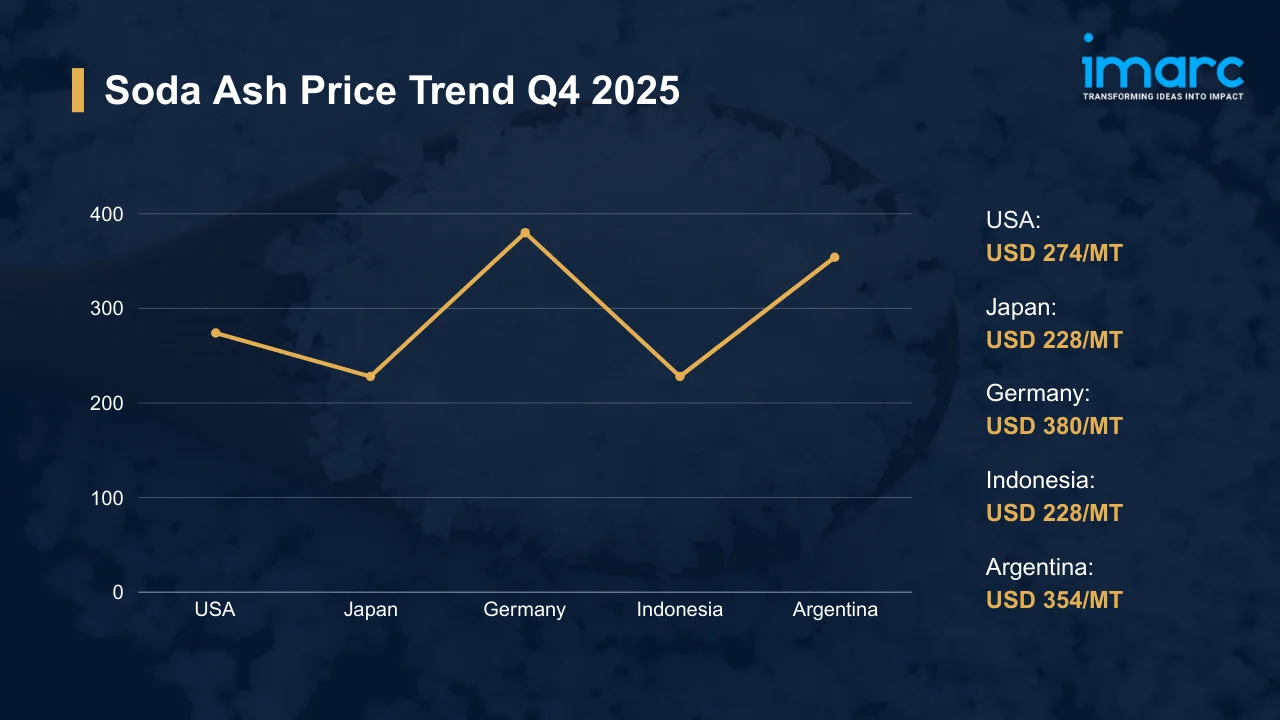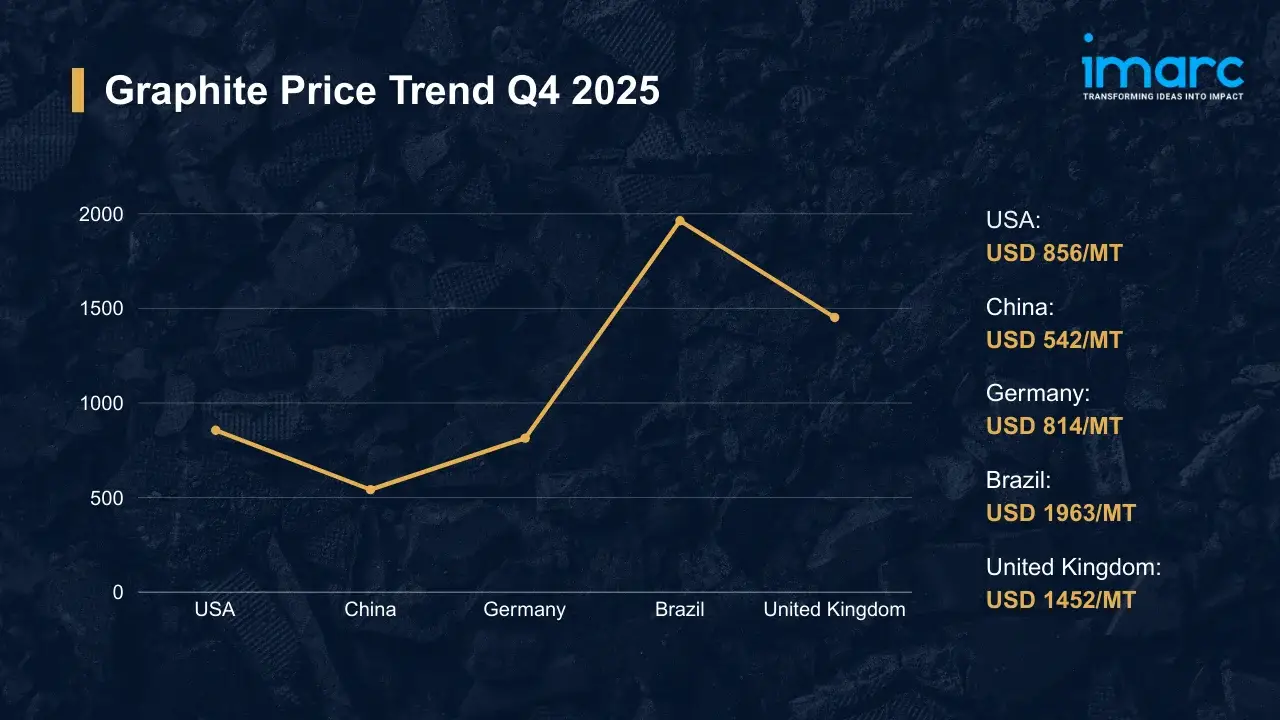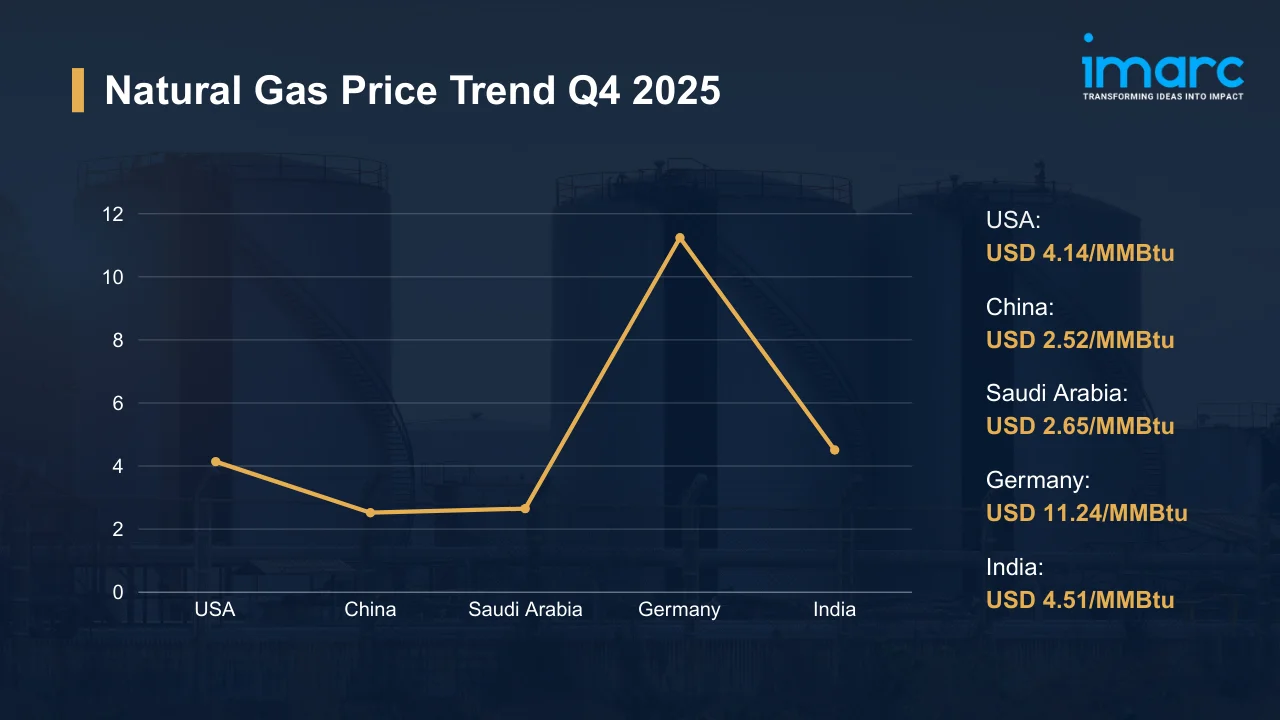Methanol Prices Nov 2025 Surge as Demand Grows in Fuel & Chemical Sectors
20-Nov-2025-(1).webp)
Methanol (CH3OH) is a volatile, colorless alcohol serving as a critical chemical feedstock across global industries, with applications ranging from formaldehyde and acetic acid production to fuel blending, MTO processes, and clean energy solutions. Given its essential role in chemicals manufacturing, construction materials, automotive fuels, and emerging renewable energy applications, pricing remains highly sensitive to feedstock costs, downstream demand cycles, production capacity utilization, and regional supply-demand dynamics. November 2025 witnessed divergent regional trends as varied industrial activity, feedstock availability, and market sentiment created distinct pricing pressures across major global markets.
Global Market Overview:
Globally, the methanol industry reached USD 39.64 Billion in 2025. Projections suggest the market could grow to USD 57.31 Billion by 2034, with a compound annual growth rate (CAGR) of 4.18% during 2026-2034. Growth is being driven by rising demand in clean energy applications including fuel cells and marine fuels, expanding usage in chemical intermediates such as formaldehyde and acetic acid, increased adoption of methanol-to-olefins technology, and growing interest in sustainable feedstocks including biomethanol and e-methanol production.
Methanol Price Trend November 2025:
Regional prices (USD per kilogram) and month-over-month change:
| Region | Price (USD/Kg) | MoM Change | Direction |
|---|---|---|---|
| Africa | 0.35 | +6.4% | ↑ |
| Northeast Asia | 0.34 | -6.1% | ↓ |
| Europe | 0.63 | +2.7% | ↑ |
| South America | 0.33 | +0.8% | ↑ |
| Middle East | 0.34 | +4.4% | ↑ |
| Southeast Asia | 0.37 | -2.1% | ↓ |
| North America | 0.70 | -2.8% | ↓ |
To access real-time prices Request Sample
What Moved Prices
- Africa: Prices rose significantly as stronger demand from formaldehyde and acetic acid producers supported procurement activity. Stable domestic production ensured adequate supply, while downstream industries in construction and resins increased purchasing volumes, lifting market sentiment. Urban infrastructure projects drove healthy consumption trends, allowing the region to register robust price gains.
- Northeast Asia: Methanol prices declined as ample regional supply and softer downstream demand weighed on sentiment. Competitive market conditions kept price gains limited despite moderate plant turnarounds tightening supply in certain areas. Demand from olefins and resins provided some support, but oversupply conditions and cautious procurement strategies from chemical manufacturers pressured prices lower throughout the month.
- Europe: Prices moved upward as tighter supply conditions offset weaker downstream consumption in certain segments. Steady imports combined with marginally higher feedstock costs lent support to pricing. Demand from biodiesel and formaldehyde producers showed resilience, while reduced availability from select suppliers helped balance oversupply concerns that characterized the previous quarter, creating modest upward momentum.
- South America: Methanol prices increased slightly as improved industrial activity and steady procurement from fuel-blending applications supported market sentiment. Ample availability from local plants and imports kept competitive conditions in place, but seasonal strengthening in construction and automotive sectors added incremental demand that curbed downward pressure and allowed for marginal price appreciation.
- Middle East: Prices rose notably, supported by firm demand from the petrochemical and fuel additive industries. Rising export orders added momentum, while planned maintenance at select production facilities restricted supply in certain hubs. Higher crude oil values also lent support, reinforcing bullish sentiment and strong regional consumption patterns that drove consistent price gains.
- Southeast Asia: Methanol prices moved lower as abundant regional production and steady imports created oversupply conditions. Demand from formaldehyde and olefins remained subdued, weighing on procurement sentiment. Economic uncertainties limited industrial consumption, while downstream sectors maintained cautious buying strategies, leaving prices under consistent downward pressure throughout November.
- North America: Prices declined marginally as balanced supply and demand kept markets relatively stable. Ample domestic production ensured adequate availability, while demand from chemicals and fuel applications remained steady but not exceptionally strong. Lower energy input costs prevented any notable upward trend, resulting in flat-to-slightly lower pricing across the month.
Drivers Influencing the Market:
Several factors continue to shape methanol pricing and market behavior:
- Supply and Production Capacity Dynamics
Local production constraints, plant maintenance cycles, and feedstock availability restrictions directly influence supply levels. Iranian plant output variations due to natural gas prioritization for heating, Chinese refinery turnarounds, and Middle Eastern facility maintenance schedules create periodic supply tightness. Regional production capacity utilization rates materially affect availability and pricing across import-dependent markets.
- Demand from End-Use Sectors
Sectors including formaldehyde production, acetic acid manufacturing, fuel blending, MTO processes, and biodiesel applications directly affect methanol consumption. Fluctuations in construction activity, chemical manufacturing output, automotive production, and clean energy adoption ripple directly into commodity demand and pricing dynamics. Industrial activity levels and downstream sector health serve as leading demand indicators.
- Feedstock Cost Dynamics
Production costs remain directly sensitive to upstream natural gas and coal prices, the primary feedstocks for methanol synthesis. Stronger feedstock values raise overall production costs, supporting higher market pricing in affected regions. Natural gas availability, particularly in the Middle East and North America, significantly influences production economics and regional competitiveness.
- Clean Energy and Fuel Applications Growth
Expanding methanol usage in marine fuel applications, fuel cells, hydrogen carriers, and biodiesel blending creates sustained demand growth. Stringent emissions regulations targeting sulfur and particulate matter reduction drive methanol adoption as a cleaner alternative to traditional marine fuels. Government mandates and decarbonization initiatives across transportation sectors support long-term demand expansion.
- Renewable and Low-Carbon Methanol Development
Growing investment in biomethanol and e-methanol production from carbon capture, renewable electricity, and sustainable feedstocks reshapes supply dynamics. Green methanol projects targeting marine fuel and chemical applications create premium market segments. Technology advances in carbon capture utilization and renewable hydrogen production support the transition toward sustainable methanol supply chains.
- Logistics, Shipping & Currency Fluctuations
International transport costs, port handling fees, vessel availability, and fuel volatility add significant uncertainties to delivered pricing. Regional price differentials reflect logistics costs and import dependency levels. Currency movements, particularly dollar strength against yuan, ringgit, and emerging market currencies, materially influence export competitiveness and regional pricing patterns for import-dependent markets.
Recent Highlights & Strategic Developments:
Recent strategic moves within the industry further illustrate evolving dynamics:
- In May 2025, the Kassø e-methanol facility in Aabenraa, Denmark officially commenced operations and began delivering e-methanol to commercial offtakers. The plant was developed by European Energy A/S and is operated in partnership with Mitsui & Co., reflecting strategic collaboration between European and global energy players focused on renewable methanol production.
- In November 2024, NTPC launched the world's first CO2-to-methanol conversion plant at its Vindhyachal facility on the company's 50th Raising Day. NTPC Chairman Gurdeep Singh highlighted the company's progress in green technologies including hydrogen, carbon capture, and indigenous development of methanol synthesis catalysts, advancing India's position in sustainable methanol production.
- In October 2024, Transition Industries LLC executed a Letter of Intent with Mitsubishi Gas Chemical Company for a long-term Methanol Sales Agreement. Transition Industries will supply 1 million metric tons annually of ultra-low carbon methanol from its Pacifico Mexinol project in Sinaloa, Mexico, scheduled to commence operations in 2028.
- In October 2024, Maersk signed a long-term bio-methanol offtake agreement with LONGi Green Energy. This strategic partnership supports Maersk's objective of reducing greenhouse gas emissions from its dual-fuel methanol vessels, with deliveries expected to begin in 2026, strengthening the maritime sector's transition toward sustainable fuels.
- In June 2024, Mitsubishi Gas Chemical became Japan's first manufacturer capable of producing bio-methanol from digester gas at its Niigata Plant, following a utilization-gas partnership agreement with Niigata Prefecture. The bio-methanol received ISCC PLUS certification, contributing toward decarbonization and environmentally responsible chemical production.
Outlook & Strategic Takeaways:
Looking ahead, the methanol market is expected to maintain steady growth at 4.40% CAGR through 2034, supported by rising demand in clean energy applications, expanding chemical intermediate usage, increased MTO technology adoption, and growing sustainable feedstock development. Regional price differentials are likely to persist, with North America and Europe maintaining premium pricing due to logistics, import costs, and higher environmental standards, while Asia faces periodic oversupply and margin pressure. Clean energy mandates, marine fuel adoption, renewable methanol capacity expansion, and carbon capture initiatives will shape medium-term supply-demand dynamics and pricing patterns.
To navigate this complex landscape, stakeholders should:
- Track methanol prices monthly and regionally to identify inflection points or early signals of shifting supply-demand dynamics, particularly monitoring Asian production cycles, Middle Eastern export availability, and North American import demand patterns that influence regional pricing trajectories.
- Benchmark procurement against regional price differentials to optimize sourcing strategies. The USD 0.37/Kg spread between South America and Europe represents significant opportunity for procurement optimization and strategic sourcing diversification across production and import markets, particularly for chemical manufacturers with flexible supply chains.
- Monitor upstream feedstock costs including natural gas and coal prices, which directly translate into production economics and market pricing. Middle Eastern gas availability, North American shale gas production, and Chinese coal-to-methanol economics materially impact regional competitiveness and global supply patterns.
- Assess downstream sector health including formaldehyde production, acetic acid manufacturing, construction activity, automotive output, and biodiesel demand as leading indicators of methanol consumption cycles and pricing inflection points. Shifts in industrial production and chemical manufacturing directly influence methanol demand.
- Evaluate clean energy and marine fuel adoption trends as stringent emissions regulations and decarbonization mandates drive methanol consumption in transportation sectors. Marine fuel applications, fuel cell development, and hydrogen carrier usage create sustained demand growth that competes with traditional chemical applications and influences pricing dynamics.
- Monitor renewable methanol project development including biomethanol and e-methanol capacity expansion, carbon capture utilization initiatives, and sustainable feedstock technology advances. Green methanol premiums, certification requirements, and environmental regulations create market segmentation that affects procurement strategies and cost structures.
- Diversify supply sources across regions to mitigate production risks, feedstock availability constraints, logistics disruptions, and currency exposure. Single-region sourcing strategies remain vulnerable to plant maintenance cycles, natural gas supply variations, and seasonal production constraints that create price volatility.
- Plan logistics and supply chains strategically to navigate shipping costs, vessel availability, port congestion, and customs procedures that create localized cost pressures and delivery uncertainties, particularly for import-dependent markets in Europe, Northeast Asia, and North America.
Subscription Plans & Customization:
IMARC offers flexible subscription models to suit varying needs:
- Monthly Updates — 12 deliverables/year
- Quarterly Updates — 4 deliverables/year
- Biannual Updates — 2 deliverables/year
Each includes detailed datasets (Excel + PDF) and post-report analyst support.








.webp)




.webp)












